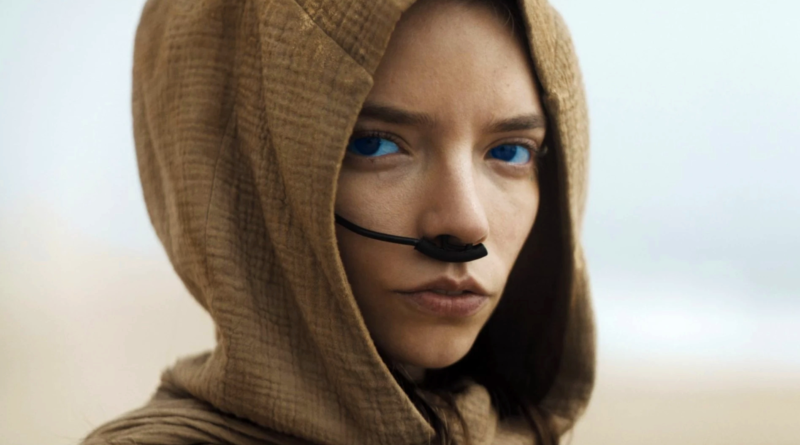Dune 3 Gets the Best Update Yet Amid a Huge Dune 4 Director Rumor
In the final moments of Dune: Part Two, Chani storms out of Paul’s court and back into the desert. Disgusted by the megalomania she sees in the man she once loved, Chani readies her hooks for the oncoming worm, which she’ll ride away from here. For a while, it looked like director Denis Villeneuve would […]
The post Dune 3 Gets the Best Update Yet Amid a Huge Dune 4 Director Rumor appeared first on Den of Geek.
Warning: contains finale spoilers for The Leftovers.
HBO’s The Leftovers opens on an ordinary street in Mapleton, New York, on an ordinary day in October, moments before an extraordinary global event – the “Sudden Departure” – changes the world forever. As 142 million souls – two percent of the world’s population – suddenly and inexplicably vanish into thin air, seemingly at random, we get to see it in microcosm. The chaos and confusion. The disbelief and destruction. The howls of anguish. It’s a powerful and harrowing scene that hammers home the existential horror at the heart of the show and sets the stage for a three-season long odyssey of grief, loss, trauma, and delusion refracted through the lenses of faith and family. The questions, the first of many, begin here. Why did this happen? Where did the people go? What does it all mean? What do we do now?
In contrast to the bleak emotional kineticism of its opening scene, The Leftovers closes with something that’s quiet, profound, and beautiful, though no less powerful. Almost the entirety of the final episode is a two-hander, focusing on the reunion between Kevin Garvey (Justin Theroux) and Nora Durst (Carrie Coon) out in the back-wilds of Australia, many decades after their last, bitter meeting. The final scene serves as a coda to the show’s existential journey, striking a beautiful note of hope for the future. And it’s achieved through simply letting Nora tell a story, a creative decision that’s as bold in its own way as the cut to black at the end of The Sopranos.
cnx({
playerId: “106e33c0-3911-473c-b599-b1426db57530”,
}).render(“0270c398a82f44f49c23c16122516796”);
});
The Leftovers was always more interested in asking questions than answering them. Its goal was to paint its characters in shades of doubt and uncertainty and watch how they made sense of their lives and the world around them, encouraging us to do the same by proxy. For the show to have ended as damn near perfectly, and as perfectly satisfyingly, as it did was a creative master stroke on the part of creator Damon Lindelof and his team, which cemented The Leftovers as not only a superlative piece of prestige television, but a work of art for the ages.
Crucially, The Leftovers reveals itself to have been a love story all along.
Kevin and Nora
Nora’s whole family – her husband and two children – vanished along with millions of others on that October day, leaving her to make sense of it all through her work at the Department of Sudden Departure. Kevin’s family remained on terra firma, but the loss and confusion of the Sudden Departure scattered them to the winds. His wife joined a cult, his step-son hitched his wagon to a mystic, his teenage daughter retreated into nihilism, and he began to descend into madness. These were two people who had lost everything in the Sudden Departure and tried and failed to find it again through each other. And yet…
The final episode “The Book of Nora” begins a little after the seventh anniversary of the Sudden Departure. Nora says goodbye to her brother, Matt (Christopher Eccleston), as she prepares to enter an experimental machine its creators claim can transport its users to the same place as the Departed. Nora allows herself to be sealed inside the contraption and it begins to fill with fluid, but just before her face is submerged the scene cuts away. The next time we see Nora she’s many years older, living a cloistered, solitary existence in rural Australia with only her birds and the occasional nun for company.
Few know she’s still alive – perhaps only Laurie (Amy Brenneman), Kevin’s former wife and Nora’s long-time friend and therapist – which explains her shock when Kevin arrives on her doorstep. He claims to have no memory of their life together beyond their fortuitous first meeting at a Mapleton Christmas dance many decades previously. He frames their reunion as no less an act of coincidence: just a man on vacation who spotted an old friend and wants her to accompany him to a party later that night. For old times’ sake.
Reluctantly, she goes. But it isn’t a party, it’s a wedding. One at which Kevin appears to be a guest of honour. Nora’s birds are also guests of honour, having been hired for the night by her friend, the nun, so the wedding guests can attach notes of love to their legs and send them heavenward with their hopes and dreams. All evening, Kevin refuses to deviate from his story, though Nora probes at its edges, her eyes searching and critical, leaving both Nora and the audience wondering whether Kevin is pretending or in the midst of some mental relapse. The façade eventually becomes too much for her, and she storms away from the wedding.
“I can’t do this,” she tells him.
“Why not?”
“Because it’s not true.”
Back home, Nora is angry when she discovers that her birds haven’t returned home. She climbs a ladder on to her flat-panelled roof and stares skyward in trepidation, just as Matt’s father, and the Millerite family from season three’s cold open, once did on similar roofs as they waited for an apocalypse that never came; one that would’ve vindicated their actions and beliefs, and, paradoxically, made them seem like beacons of sanity. To Nora, the birds represent both her family, and her fear of once again losing the things that she loves.
Nora pedals off to the church. As she arrives, she sees a man in a leather jacket clambering down a ladder from a bedroom in the loft. He greets Nora sheepishly before roaring off on a motorcycle. The nun looks no less sheepish when she appears at the front door of the church. Nora rebukes the nun for her handling of the birds and blames her for their absence.
“Maybe they’re delivering the messages of love,” the nun offers with a barely repressed smile.
“It’s great that your newlyweds believe that a bird with a range of 50 miles is gonna carry their stupid poetry to Timbuktu, but don’t sell that bullshit to me,” Nora replies.
“I’m not trying to sell you anything. It’s just a nicer story.”
Nora accuses the nun of sleeping with the man on the motorcycle, and when the nun refuses to acknowledge the truth, Nora is even more unequivocal in her response: “You’re a fucking liar.”
Truth, of course, is one of the cornerstones of The Leftovers. What is true? What is truth? Who or what caused the Sudden Departure? Where did all the people go? Was Nora transported to the same place? If so, how was she returned? Was Kevin once immortal? Is Kevin telling Nora the truth now? And, of course, a central theme: what is it possible to believe, and what should one believe, in the absence of an answer?
Kevin returns to Nora’s house the next day and confesses the truth: that he remembers everything; that he’s been coming back to Australia every year to search for her, even though he feared the chances of her being alive were somewhere between gossamer thin and zero.
“Every year I would say to myself, I can’t do this. I’m not doing this. Never again. But every year, I would come back. Because… Because I couldn’t stop. And a couple of days ago I showed your picture to that nun. And I saw it in her eyes. She recognized you. She knew you. And when I saw you… I couldn’t believe it. There you were… But I didn’t know what to say. Or where to start, and so I just thought, ‘Oh fuck it, I’ll erase it.’ Just erase it all and maybe that would give us another chance. But you were right. It’s not true. That’s how I found you, Nora. I… I refused to believe you were gone.”
Kevin was once considered by many – perhaps even by himself – to be the Messiah, and in pursuit of that conviction he took himself to the edge of death and beyond many times. New gospels, a whole new testament, sprouted from his trials and deeds. But when the flood his desert-wandering father prophesied would claim the earth and Kevin’s mystical role in preventing it proved to be as fanciful as any number of apocalyptic pronouncements made by world-ending cults, the beliefs and rituals that swirled around Kevin’s supposed powers and abilities went the way of Thor and Ra, and non-magical reality slowly re-asserted itself.
Kevin stands before Nora an ordinary man of flesh and blood: physically fallible, with a pacemaker to prove it. And yet his almost evangelical belief that Nora was still alive demonstrated a faith that was at once richer, more powerful, and longer lasting than any beliefs he’d ever held about his destiny or the departure. His faith was in love. In Nora. As all-consuming as it was irrevocable.
“You want some tea?” she asks him.
After twenty-seven episodes of militant cults, radicalised doubt, messianic wrangling, religious quests, ritualistic deaths, biblical iconography, and planet-wide predictions of doom it’s fitting that it would all boil down to two people talking.
Though The Leftovers often went big, it was always about the little moments: the stories we need to tell ourselves to paper over the cracks in our existences; to keep our families and relationships together; to live our lives with some measure of peace. And so, at a dining table, over cups of tea, Nora tells Kevin the story of what happened to her after she climbed inside the tank. Where she went; how – and why – she came back.
The Book of Nora
The device worked. The tank transported Nora to a world that was identical to theirs except the Sudden Departure had happened in reverse, taking 98 percent of the human population instead of two: “Over here… we lost some of them. But over there, they lost all of us.”
Nora made the long journey back to Mapleton – “Planes don’t really fly over there. They have the resources, just not enough pilots” – and returned to her old home, where she observed her children, now grown, living with her husband and a new woman. They were all happy. “I understood that here in this place, they were the lucky ones. In a world full of orphans they still had each other. And I was a ghost… who had no place there.”
Nora sought out the man who’d developed the machine on their side of the partition, now settled in this new world, and convinced him to make a new machine to send her back.
“Did I… think about you?” she asks rhetorically. “Did I wanna call you? Did I wanna be with you, Kevin? Of course I did. But so much time had passed. It was too late. And I knew that if I told you what happened that you would never believe me.”
Nora’s story is either true or false, and in the absence of any proof beyond her words it’s left to Kevin, and the audience, to act as arbiters. It’s worth considering each eventuality, if not to arrive at a definitive answer, then to both better understand Nora, and fully appreciate Kevin’s response.
Assuming Nora’s Story Is True
In a world in which the Sudden Departure happened in the first place, not to mention one in which Kevin seemed to possess powers of divination, it’s tempting to ask: why shouldn’t we believe Nora’s story? After all, Kevin journeyed to the twilight realm between life and death several times, seeing things there that made us strongly question whether mental breakdown was sufficient as an explanation. The very fact that he thrice survived what should have killed him is cause enough for doubt.
Though Nora’s story is no better at answering the question of what caused the Sudden Departure the tone and texture of her experience eschews the supernatural in favor of a more scientific approach: machines, technology, the multiverse. This fits with what we’ve learned about Nora. She’s always been rational, even in her irrationality; someone who never suffered fantasists or liars gladly.
When a man who’d preached atop a column in the town of Miracle, Texas, died of an ordinary heart attack, her brother, Matt, helped shroud his death in mysticism and mystery both as a favor to the man’s wife, and in a bid to bolster the faith of the townsfolk. Nora tore a page from the play-book of the Guilty Remnant – the silent, chain-smoking cult whose raison d’être was to stand as living and hostile reminders of the Sudden Departure – and angrily exposed the truth, because she refused to participate, even tacitly, in a lie.
Everything up to and including Nora’s reaction to Kevin’s feigned ignorance and her dealings with the nun demonstrate a through-line of not just honesty, but righteous anger in the face of untruth and false comfort. From a purely psychological perspective it makes sense to take Nora at face value.
It’s not inconceivable to imagine, of course, that Nora entered the machine, drowned as the water enveloped her, and before she was rescued by either the scientists or Matt, went to a similar place to that which Kevin visited during his own wanderings in death’s hinterlands. And whether “real” or imagined, Nora’s experiences would almost certainly have seemed “true” to her.
We can, however, discount any notion that the events of the final episode occurred anywhere other than “the real world.” Damon Lindelof himself confirmed as much in an interview with Esquire. “For someone who wrote a show where there was a misdiagnosis of ‘they were dead the whole time’ attributed to the end of it, I would have to be a masochist to try to do that here in The Leftovers,” he explained. “What I would say that is critical to us is that everybody understands that this finale is taking place in real space… in the same reality that all other episodes of The Leftovers take place, probably with the exception of the ‘International Assassins’ episodes [which chronicle Kevin’s after-death dalliances], which very clearly are not taking place in this reality.”
Assuming Nora’s Story Isn’t True
There’s an undeniably stronger case to be made that Nora’s story isn’t true, though how much you agree with that statement probably depends on how you view the world; whether your lens is scientific or religious, or some point between the two.
Thinking clinically and critically, if science had reached the stage where people from our world could be sent to the reverse departure world and back with relative ease then surely there would have been a thriving inter-world travel industry in full swing by the time Kevin tracked Nora down, and she would have been its poster girl. Even supposing that Nora was a statistical aberration – the only departure-naut to have survived the process – and that she kept her survival and subsequent return a secret from everyone, including the scientists – or charlatans – behind the machine, her story is nevertheless filled with such a glut of questionable, implausible and fantastical details as to make it almost unswallowable.
While the Nora we know despises liars, cheats and seekers of easy answers, the loss of her children was a wound that refused to heal, and over time her hope and defences may have lowered to the point where embracing a comforting untruth seemed preferable to embracing oblivion (which she’d tried to do many times in any case). Her reaction to the nun, then, angrily mocking her for expressing a willingness to embrace a story just because it was “nicer,” could be seen as a projection of Nora’s own angry feelings for having essentially done the same.
In many ways, Nora is the better “nun.” Both women abandoned ordinary lives to uphold the integrity of a story. Whereas the nun broke her covenant by sleeping with paramours, Nora kept hers sacred. She needed isolation to seal her story in amber, fearing that any scrutiny, especially from Kevin, would destroy the “comforting untruth: she’d built to protect and sustain herself. Arguably, whatever the literal truth, Nora had reinvented heaven just for herself, one unburdened by the strictures and rules of organised religion. And within that heaven she’d contented herself that her children were safe, and where they now belonged. After all of her pain, that’s the thing that mattered most to Nora.
Kevin’s Belief in Nora is True
To get to the heart of the objective truth of Nora’s story you could scrutinize her eyes and body language as she tells it. When she recounts certain details, like the other world not having enough pilots to fly their planes, her eyes look up and to the right, a sign some experts claim shows deceit or invention. Many times she seems to hold Kevin’s gaze as she talks, with an air of either defiance or desperation. But when she talks about missing Kevin it doesn’t matter that her eyes veer to the left. We don’t need a body language expert to know for sure that Nora loves, and has always loved, Kevin. It’s all there in his eyes, too. Especially when, at the end of her long story, he looks at her and says with supreme and instant conviction:
“I believe you.”
“You do?”
“Why wouldn’t I believe you? You’re here.”
“I’m here,” says Nora, as she reaches out her hand to Kevin.
When the Sudden Departure struck, it added fresh layers of myth, misery, madness, and mystical contemplation to the already muddled story of our species. Faith and families were fractured. Therapists became patients, humble servants became holy warriors. Mankind was plunged back into its primordial childhood, and forced to fight anew for a way to co-exist with the Departure, just as it had found a way to co-exist with death. The world, and our characters, had to wade through their pain and confusion, trying on coping strategies like hats, moving through the five-stages of grief towards an acceptance they never thought they’d find.
But with two words, “You’re here,” Kevin and Nora find it. Through their love. In their faith for each other, and their acceptance of the stories they’d each fused with their fragile hearts. Outside, as the two lovers clasp hands, enjoined after so many years apart, Nora’s birds return like Old Testament doves divining dry land after the horror of the flood. Kevin and Nora are finally healed, and the world around them is healing, too.
When all is said and done, The Leftovers leaves us with the touching, and well-earned, notion that where and in whom we place our faith matters much more than the answers to the big existential questions – which might not have answers anyway. We are the answer. Time is the answer.
Love is the answer.
The Leftovers is streaming on Max in the US, and on NOW and Sky Go in the UK.
The post The Leftovers Ending: Explaining the Final Scene appeared first on Den of Geek.
Recommended Story For You :

Now Anyone Can Learn Piano or Keyboard

Before you spend a dime on tattoo removal you need to know something VERY important.

You can train your voice and become a brilliant singer!

Learn to Draw like a Master Artist

The World’s Largest Collection of Tattoo Designs Beautiful Designs

Turn up your speakers get ready for some epic guitar

While You Sit back & relax & and let AI do the heavy lifting for you.

ukulele lessons for beginners

You Too Can Use Mentalism Effects & Magic Tricks To IMPRESS Anyone...


